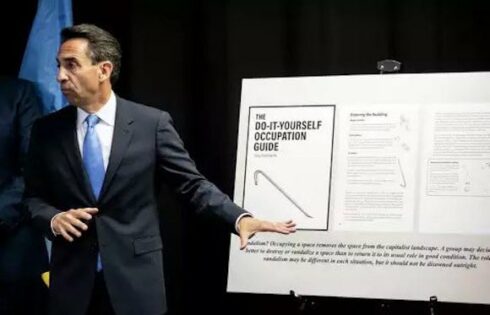
‘The fact that something is published in a journal doesn’t mean it’s true,’ scientist said
Scientific censorship mainly comes from well-intentioned scientists, not from media outlets or activists, a group of authors wrote in a recently released study in a major academic journal.
Thirty-eight academics, including Glenn Loury, John McWhorter, and Steven Pinker, co-authored a paper in the Proceedings of the Natural Academy of Sciences, released Nov. 20, titled “Prosocial motives underlie scientific censorship by scientists: A perspective and research agenda.” The authors examined censorship of scientific research, concluding that it is primarily driven by other scientists or the authors themselves.
Scientists censor the work of their peers and themselves in attempts to save others from allegedly harmful information and themselves from backlash for unpopular conclusions.
One author, who holds a doctorate from Columbia University, told The College Fix that readers must remember scientists’ fallibility. “We should be mindful… that scientists are people too,” Musa al-Gharbi, a Heterodox Academy research fellow, said in an emil.
Even more, “I think people often misunderstand academic journals,” al-Gharbi (pictured) said. “For instance, the fact that something is published in a journal doesn’t mean it’s true. In fact, most findings published in scientific journals are probably false.”
Academic journals publish articles that are interesting to their editors and meant to promote discussion and examination from other academics, al-Gharbi said.
“Individual studies are provisional, highly-fallible, typically rather limited pictures of the world that are likely to be overturned, contested or revised downstream as more and better evidence is collected,” he said. “Science is about iteratively improving our understanding of the world through painstaking accumulation of lots and lots of evidence over time.”
However, scientists can be more “confident” about their findings when they are replicated by others, use large sample sizes, and appear to be free from bias or error, he said.
Cory Clark, a behavioral scientist at the University of Pennsylvania and paper co-author, agreed that “most” of the conclusions science journals publish are not necessarily true, she told The Fix in an email. Journal articles are generally more trustworthy than sources like TikTok due to scientific rigor, but readers should exercise caution, she said.
Even reviewing evidence in all the most reputable journals can give someone a false view of a controversial issue, al-Gharbi said. The journals can skew information toward one point of view, creating the impression that most of the evidence supports that view when it may actually not be conclusive or even point in the opposite direction.
The lack of reliability of scientific findings largely arises from scientists’ self-censorship under pressure from political ideology, Clark and al-Gharbi stated.
Clark, al-Gharbi, and their co-authors stated in the paper that “facing backlash, some scholars have retracted their own papers even when they identified no errors.”
“Nearly all U.S. scientists report self-censoring their empirical beliefs somewhat,” they wrote.
However, if academics collectively refuse to self-censor, persist in getting their findings published, or find alternative outlets to publish their information, the “illiberal faction” of censors will not be successful in stopping them, al-Gharbi told The Fix.
In a Nov. 20 article in The Chronicle of Higher Education, al-Gharbi and Clark wrote that academics who censor usually do so with “benign motives.”
“What’s new is that journals are now explicitly endorsing moral concerns as legitimate reasons to suppress science,” they wrote.
In their paper, Al-Gharbi, Clark and their co-authors suggested trying to scientifically measure or predict potential dangers that could be caused by the publication of research findings rather than “relying on the often arbitrary intuitions and authority of small and unrepresentative editorial boards of journals.”
MORE: Science education journal seeks articles on ‘systemic oppression’ in biology
The authors referenced a Dec. 20 editorial by Nature Communications, a popular and respected academic journal, that explained its decision to retract a study demonstrating that mentees of male mentors were more successful in scholarship than mentees of female mentors.
Nature’s decision came after the study attracted backlash and led to the publication apologizing for “any unintended harm derived from the publication of this paper,” it stated in its editorial.
In April, 29 co-authors of a paper entitled “In Defense of Merit in Science” finally saw their work published in the Journal of Controversial Ideas after struggling to find a journal that would accept it, The Fix reported at the time.
One editor reportedly told the authors that their work was “downright hurtful,” two of the authors wrote in an April 27 article in The Wall Street Journal.
Life Sciences Education, an academic journal that publishes research in biology education, endorsed its own ideology earlier this year when it called for research papers bringing attention to “Equity, Inclusion, Access, and Justice,” The Fix reported at the time.
MORE: ‘Too rock heavy,’ too ableist, too white: Geoscience students identify concerns in field
IMAGE: Columbia University
Like The College Fix on Facebook / Follow us on Twitter






Please join the conversation about our stories on Facebook, Twitter, Instagram, Reddit, MeWe, Rumble, Gab, Minds and Gettr.